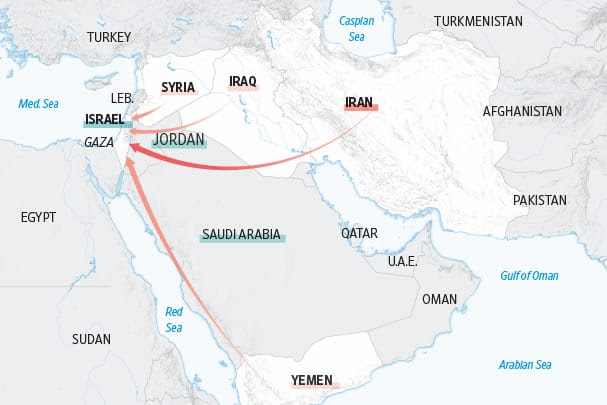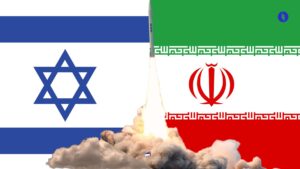After three decades of shadow war and 13 days of foreshadowing, Iran launched its first-ever direct attack on Israel early on Sunday morning.
The attack – which comes after Israel’s recent airstrike on the Iranian embassy compound in Damascus – was unprecedented for its scale (350 projectiles), target (Israel directly), and source (Iran directly).
Iran also used different weapons (drones / cruise missiles / ballistic missiles); with different speeds (nine hours / two hours / 12 minutes to target); from different sites (mostly Iran, but also proxies in Yemen, Iraq and Syria).
Stay on top of your world from inside your inbox.
Subscribe for free today and receive way much more insights.
Trusted by 134,000+ subscribers
No spam. No noise. Unsubscribe any time.
The presumed aim was for them all to reach Israel en masse to overwhelm Israel’s air defences. But most projectiles were still downed before even reaching Israel’s borders, thanks to:
- Support from allies like the US, UK, and France
- Iran’s own technical failings (half its ~110 ballistic missiles failed), and
- Intervention from neighbours like Jordan (a statement to placate domestic anti-Israel sentiment said Jordan only shot down drones in its airspace as “self-defence” rather than for the benefit of Israel).
Israel’s layered air defences then handled most of the rest, with the ~16 minutes of action reportedly costing Israel an estimated $1B.
Seven of Iran’s 110 ballistic missiles still made it through, causing minor damage at Nevatim airbase, the main home for Israel’s F35 fighter jets (which Iran blames for Israel’s earlier Damascus attack).
And throughout it all, Iran’s behaviour was interesting to watch.
72 hours before launch, it started ‘telegraphing‘ its plans and then, with drones in the air, its UN mission tweeted that “the matter can be deemed concluded” (ie, ‘no backsies’). After impact, Iran’s president and others went on to warn Israel to just leave it, or face more attacks.
Why? Iran was likely looking for that elusive sweet spot in its shifting Venn diagram of a) satisfying its own domestic pressure to respond to Israel, b) maintaining credibility in the broader region, and yet probably also c) assuming few projectiles would actually hit Israel, narrowing Israel’s justification to hit back.
And the world’s responses have been intriguing, mostly mixing condemnation of Iran with an urging of Israel not to escalate things further. US officials are also describing the events as a major victory for Israel, likely seeking to give Netanyahu political space to just “take the win“.
But Israel’s leaders are seeing it differently, with key hardliners in Netanyahu’s threadbare coalition saying Israel should respond with a “crushing attack” that resonates “for generations”. So Netanyahu is again facing pressure abroad to show restraint, while facing pressure at home to go hard.
And that presents Netanyahu with his own shifting Venn diagram, seeking to a) respond to domestic pressures, b) maintain regional credibility, and c) retain international solidarity, without just d) bolstering the regime’s support in Iran.
INTRIGUE’S TAKE
So this whole situation now looks like one giant Rubik’s cube of leverage, escalation, deterrence, and destabilisation. But have a think about who ‘wins’:
- Israel has now flexed two of its sources of power (air defence and alliances), and seen two of its vulnerabilities moved off the front pages (political instability and the humanitarian toll in Gaza), watching them both be replaced with a vivid global illustration of the very thing Israel has been warning about for decades: Iranian missiles over Israel.
- Meanwhile, Iran claims it’s now shown its resolve, flexed its ability to penetrate Israel’s air defences, and perfectly calibrated it all (‘maximum symbolism, minimum damage’) to avoid escalation.
But ultimately, rather than deter Israel, Iran essentially gave it a much-needed moment of international solidarity. That’s an Israeli win. And yet Israel’s leaders – fuelled by the historic sight of Iranian missiles over Jerusalem – will struggle to pocket that solidarity and heed the world’s calls for restraint.
That turns up the heat for the region, where everyone keeps saying they don’t want a wider war, and yet everyone keeps crisscrossing the map with red lines: each intended to end the cycle, but all collectively raising the risk of accelerating it.
Also worth noting:
- Shortly before launching its attack, Iran also seized a Portuguese-flagged cargo ship carrier in the Strait of Hormuz, claiming it was Israeli-owned. 20 sailors from the Philippines were on board.
- Shrapnel from Iran’s attack on Israel critically injured a 10-year-old Arab-Israeli Bedouin girl in the Negev desert.
- Hours after Iran’s attack, Hamas reportedly rejected the latest ceasefire proposal from mediators.
- Following the weekend’s attacks, the US House Speaker now says he’ll “try again” to bring a stalled US military aid package to a vote, including support for Israel plus potentially Ukraine and US allies in Asia.








